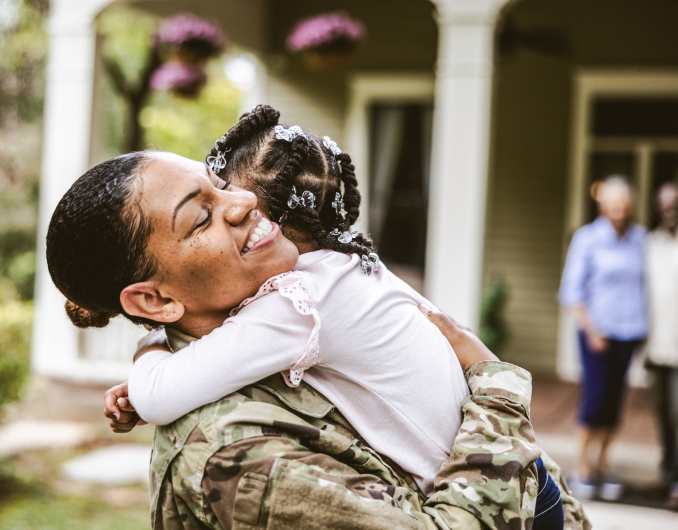Home Loans
Own a home on your terms.
Discover programs and benefits available to Soldiers and veterans who are looking to buy or refinance a home. This includes lower interest rates along with down payments as low as $0.

Down payment as low as $0
Get better rates and lower down payments.
The Veteran Affairs (VA) Home Loan federal program helps Soldiers and veterans get better terms and benefits when purchasing or refinancing a home compared to a non-military borrower.
Stability
Stability
for what’s
for what’s
to come.
to come.
Ways to Use Your VA Home Loan
Your VA Home Loan is a lifetime benefit that you can use on future purchases as long as you meet the eligibility requirements.
Purchase a home.
Secure your new home from a private lender with little to no money down, less costs up front, and lower monthly payments.
Refinance to save each month.
Refinancing lets you replace your current loan with a new one under different terms. The VA offers an Interest Rate Reduction Refinance Loan (IRRRL) for reduced payments on existing VA Home Loans.
Refinance to take out cash.
Take cash out of your home equity or refinance a non-VA loan into a VA-backed loan. The VA offers cash-out refinancing if you decide to go with this option.
Native American Direct Loan (NADL) Program
If you’re a veteran, and you or your spouse is Native American, the NADL program may help you get a loan to buy, build, or improve a home on federal trust land. You may also get a loan to refinance an existing NADL and reduce your interest rate.

Benefits that protect your future
Take the first step.
Find out more about becoming a Soldier and if a career in the Army is right for you.
Common questions about home loans.
Not finding what you need?
Chat with us any time.
What is a COE?
What is a COE?
A Certificate of Eligibility (COE) is documentation to prove to your lender that you qualify based on your duty status and service history.
Does the VA offer home loans for surviving spouses?
Does the VA offer home loans for surviving spouses?
Yes. To get a VA-backed home loan as the surviving spouse of a veteran, you’ll need a Certificate of Eligibility (COE) to show your lender that you qualify for this benefit. You’ll also need to meet your lender’s credit and income requirements to get a loan.
What is the VA funding fee?
What is the VA funding fee?
The VA funding fee is a one-time payment (which can be waived in certain situations) that veterans, current Soldiers, or survivors pay on a VA-backed or VA direct home loan. The fee helps lower the cost of the loan for U.S. taxpayers since the VA Home Loan program doesn’t require down payments or monthly mortgage insurance. The fee is calculated as a percentage—between 1.4 and 3.5 percent—of your total loan amount depending on how much you put down and whether it’s your first time using the loan. The fee is paid or included in the loan balance at closing. It can also be paid by the seller, lender, or any other party on your behalf.
Do I have to meet income and credit requirements to get a loan?
Do I have to meet income and credit requirements to get a loan?
Yes. You’ll need to meet your lender’s credit and income loan requirements to receive financing for a VA-backed home loan.
Can I get VA financial counseling to help avoid foreclosure?
Can I get VA financial counseling to help avoid foreclosure?
If you’re a veteran or the surviving spouse of a veteran, the VA will provide financial counseling regardless of the type of loan you have. If you have a VA-direct or VA-backed loan, you can get a VA loan technician assigned to your loan to provide financial counseling and help you with your servicer or work with you directly in the case of a VA-direct loan.